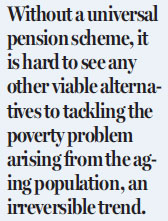Universal pension crucial to tackling elderly poverty

Hong Kong has the dubious reputation of having the widest income gap among developed economies. Unsurprisingly, poverty has become a glaring embarrassment for a city with a per capita GDP ranking among the top 20 in the world.
At least the government is frank about the poverty problem it faces. Latest official figures show that last year, one out of five people in Hong Kong lived below the poverty line, with income of less than HK$4,000 a month.
Despite the rapid increase in budget expenditure on social welfare, particularly recurrent spending on direct subsidies to the most needy, the government appears to be fighting a losing battle to build a more equitable society. Chief Secretary for Administration Matthew Cheung Kin-chung, who was welfare chief before taking up his new post in July, explained that the rapidly aging population has left "not much room" for the poverty rate to fall significantly.
Government data released earlier this year show that, as of last year, people aged 65 or above accounted for 16 percent of the population; the proportion is projected to rise to 36 percent by 2066. This worrying demographic trend is "irreversible", resulting in tens of thousands of residents falling into the elderly category every year, Cheung said.
Social activists have criticized the government for its inadequate measures to care for the elderly. They urged it to expand the old-age allowance schemes to prevent the elderly from falling into poverty once they retire.
Others put the blame on the government's failure to build public housing fast enough to meet the needs of poor families who are forced to pay a large portion of their monthly incomes on rents. The wait for public housing by families who passed the means test has extended to four years from three.

The government, of course, can greatly reduce, or even eliminate, the count of people below the poverty line, according to Secretary for Labor and Welfare Law Chi-kwong, a noted sociologist and former university professor. In an interview on television, Law said the poverty issue is much more complex than what can be measured by the poverty rate.
If image building is all the government cares about, it can greatly cut down the poverty rate quickly by increasing direct handouts to the neediest. But the government is obliged also to help the many other families who find it increasingly difficult to make a decent living in this costly city.
Law mentioned in particular the working poor, comprising more than 200,000 households, who are forced to live in squalid subdivided flats with their families. Their plight has been captured vividly in various images of young children doing homework or playing in cramped living spaces of no more than 10 square meters that are their family homes. They clearly need help, Law said.
Those social activists who are loudest in blaming the government for neglect need to understand that the money available to the government for spending on welfare is not unlimited as debt financing is not an option - and the aging population seriously constrains the economic growth that is needed to help boost government revenue.
One alternative is to broaden the tax base by introducing a sales or value-added tax specifically to finance social-welfare expenditure. But earlier proposals of such a levy were shelved in the face of vigorous objection from the business sector for obvious reasons and, surprisingly, from grass-roots advocates, citing concerns that the proposed tax would penalize the less well-off families because they tend to spend a larger proportion of their incomes on daily necessities than the rich do.
Another suggestion that has won widespread support from worker groups is to institute a universal pension scheme that can ensure a basic income for all retirees. But the proposal has been bogged down by arguments over the government's proposal to include a means test.
Without a universal pension scheme, it is hard to see any other viable alternatives to tackling the poverty problem arising from the aging population, an irreversible trend.
The author is a current affairs commentator.
(HK Edition 12/04/2017 page8)
Today's Top News
- Militarism revival efforts criticized
- Leadership highlights Party conduct
- Forging a human-centered future in era of smart machines
- Land-sea trade corridor key to regional progress
- Local rules to be reviewed to help disabled
- Stronger RMB points to resilience






























